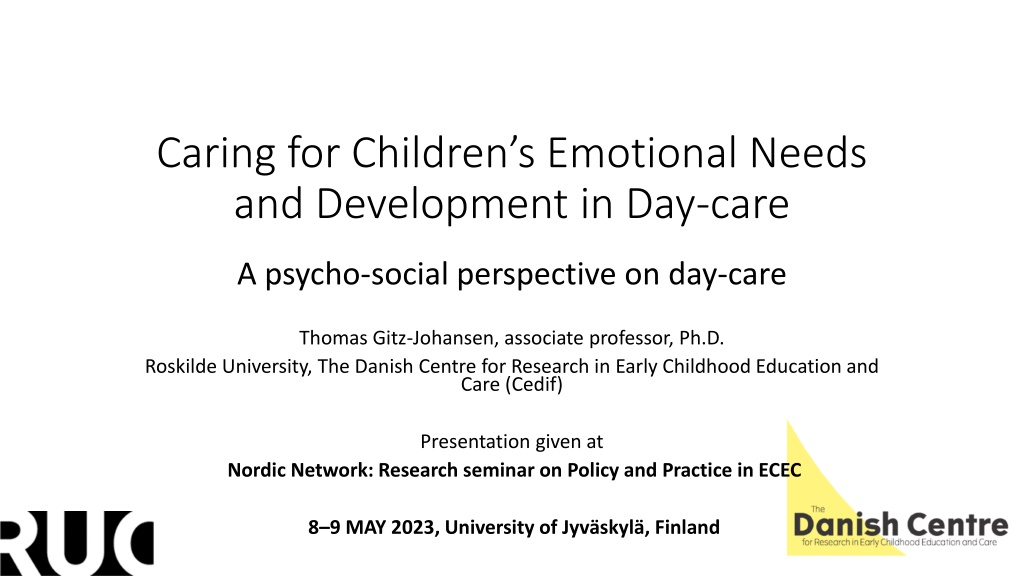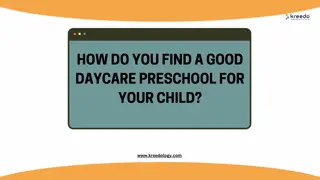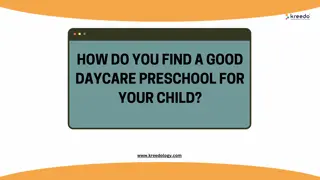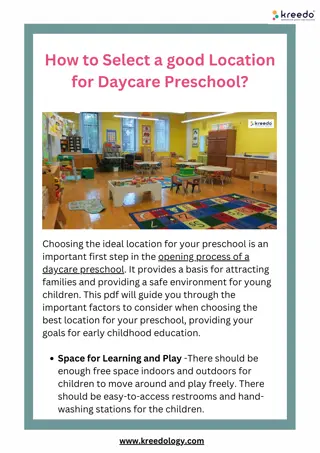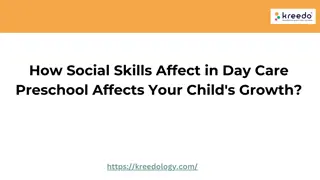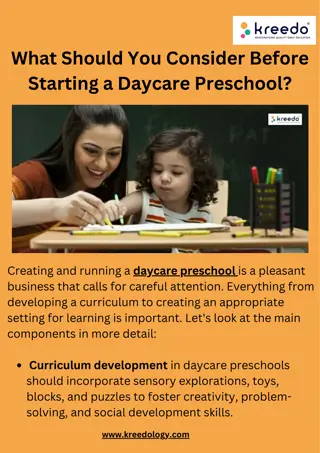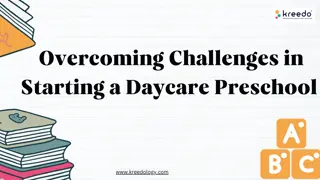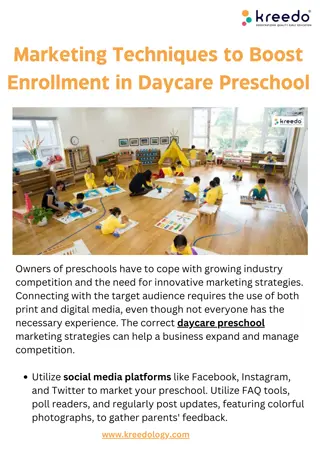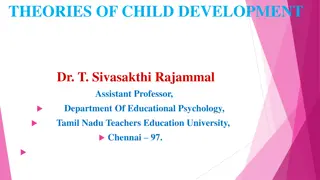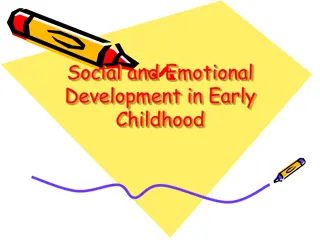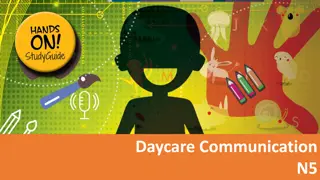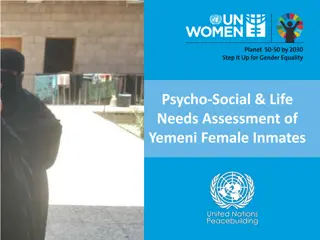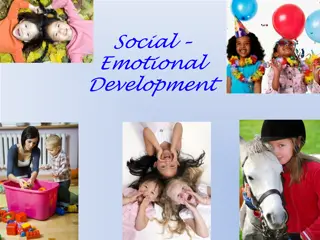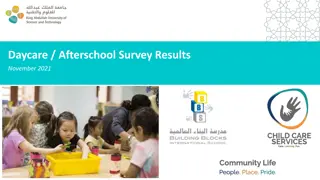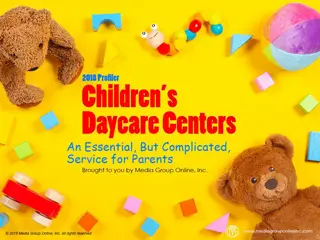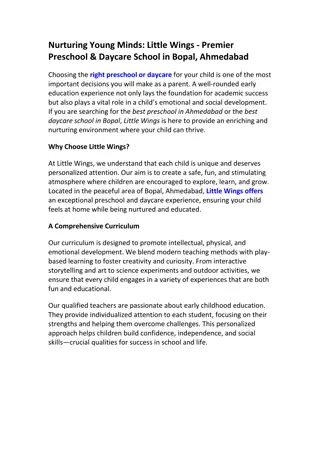Understanding Children's Emotional Development in Daycare from a Psycho-Social Perspective
Scientific evidence emphasizes the early onset of emotional development and its profound impact on lifelong outcomes. The quality of childcare processes plays a pivotal role in shaping children's social-emotional development, highlighting the importance of nurturing emotional relationships in daycare settings. Insights from neuroscience further underscore the significance of early care in influencing brain development through relational experiences. Prioritizing emotional well-being over academic prowess in preschoolers is crucial for their overall life satisfaction.
Download Presentation

Please find below an Image/Link to download the presentation.
The content on the website is provided AS IS for your information and personal use only. It may not be sold, licensed, or shared on other websites without obtaining consent from the author. Download presentation by click this link. If you encounter any issues during the download, it is possible that the publisher has removed the file from their server.
E N D
Presentation Transcript
Caring for Childrens Emotional Needs and Development in Day-care A psycho-social perspective on day-care Thomas Gitz-Johansen, associate professor, Ph.D. Roskilde University, The Danish Centre for Research in Early Childhood Education and Care (Cedif) Presentation given at Nordic Network: Research seminar on Policy and Practice in ECEC 8 9 MAY 2023, University of Jyv skyl , Finland
Early care for emotional needs and later development A growing body of scientific evidence tells us that emotional development begins early in life, that it is a critical aspect of the development of overall brain architecture, and that it has enormous consequences over the course of a lifetime. These findings have far- reaching implications for policymakers and parents, and, therefore, demand our attention. (2004, National Scientific Council on the Developing Child, Center on the Developing Child at Harvard University) Thomas Gitz-Johansen, gitz@ruc.dk, Roskilde University, Denmark
Impact of Childcare Process Quality Impact of Childcare Process Quality on Social on Social Emotional Development Emotional Development The importance of high-quality ECEC for children s development is undisputed ( ). In this context, process quality is highlighted as the most critical dimension of quality in ECEC as it directly affects the child s development ( ). Process quality refers to the proximal processes of children s experiences in ECEC and includes the social, emotional, physical, and instructional aspects of interactions between caregivers and children as well as among children such as day-to-day interactions, activities, and learning resources. (Seiler et al, 2022, Long-Term Promotive and Protective Effects of Early Childcare Quality on the Social Emotional Development in Children. Frontiers in Psychology, 13:854756, p. 3) Thomas Gitz-Johansen, gitz@ruc.dk, Roskilde University, Denmark
Early care and brain development the function and structure of the mind and brain are shaped by experiences, especially those involving emotional relationships. To put this concisely, the self organization of the developing brain occurs in the context of a relationship with another brain, another self. (Allan Schore, 2019, The Development of the Unconscious Mind, p. 2-3) Thomas Gitz-Johansen, gitz@ruc.dk, Roskilde University, Denmark
What we know from neuro-science about children s development The most important predictor of adult life satisfaction is the child s emotional health, followed by the child s conduct. The least powerful predictor is the child s intellectual development. ( ) For preschoolers, reading the emotional cues of other kids and forming a bond with the teacher are more important than the pre-academic skills of learning letters and colors and shapes. Right now, there s too much emphasis on executive function, which is a later- developing left-brain function. Preschools should make sure to keep the focus on the social and emotional experiences that promote healthy right brain development. (Allan Schore, 2015, in Let s Grow Kids, italics in original, bold added) Source: https://letsgrowkids.org/expert-articles/dr.-allan-schore-on-early-relationships-and-lifelong-health Thomas Gitz-Johansen, gitz@ruc.dk, Roskilde University, Denmark
Daycare in DK Summary: In 2013, the share of children in daycare was 19% for children aged under one year, 91% for children aged one to two years and 97% for children aged three to five years. (Gitz-Johansen 2020, Childcare in uncaring times) Thomas Gitz-Johansen, gitz@ruc.dk, Roskilde University, Denmark
Thomas Gitz-Johansen, gitz@ruc.dk, Roskilde University, Denmark
A struggling 0-3 year nursery (vuggestue) A lot of crying children can be heard in the nursery today. My impression is that the children are tired, hungry, and the newcomers do not feel secure in the unfamiliar room with unfamiliar adults and other children. As soon as one of the children starts crying the staff member moves closer to this child, turns her face to him or her, and includes the child s name in the song. By doing so, the crying of this particular child is kept at bay but then the other children are left with less comfort and stimulation from the staff member and her song and some of them begin to cry. [Lunch arrives and the children eat while the staff try to keep them from crying.] The children have now finished eating but some of them are still crying. The adults hurry from one child to another and try to comfort them, while at the same time clean up the tables after lunch, clean the children, change diapers, get them in their pajamas, put them in their prams, and get them to settle down and fall asleep. During all of this, they have to try to comfort crying children here and there. One of the staff members who is carrying a child in her arms passes by another child, who looks as if she is about to cry, and the staff member says to the child in a very stern voice that now she is not to begin to cry too. I get the feeling that this staff member is about to reach her limit of what she can cope with; the level of stress that comes from the crying children is making her increasingly upset and she seems about to get irritated or angry. A while later calm is finally settling over the nursery as some of the children have been put down to sleep in their prams, but now one of the girls, who is sitting on the floor, starts crying. The staff member s face now looks angry, and she tells the girl off angrily, but then she stops herself and says something kind and puts the girl down on a mattress with some toys. In the midst of the stressed and hectic atmosphere, she grips the girl too hard and the girl starts crying. Even though she is visibly stressed and under pressure, the staff member again gets her temper under control and talks calmingly to the crying girl who then stops crying. As an observer to this situation I feel dizzy, stressed and exhausted by the hectic atmosphere, the crying and the constant threat of one or more children starting to cry. Thomas Gitz-Johansen, gitz@ruc.dk, Roskilde University, Denmark
Cultural / Societal Context Political and economic conditions Circles of Care in day-care Containment is an onion-like phenomenon in structure many layers are required when the task is the growth of mind. (M. Rustin, 2011, Passion in the classroom, p. Parents and board Institution s management Staff culture Individual adult Child / Children 2) Thomas Gitz-Johansen, gitz@ruc.dk, Roskilde University, Denmark
The socio-political context of early care Reduced spending on public institutions including day-care: Child-to-adult ratio almost doubled since 1972 More children pr. adult; puts stress on adult s care-task and children s ability to self-care . A dominant daycare paradigm of learning and competence development (the competition state). Psycho-social effect: De-symbolization (Lorenzer) of care needs and emotions. A collective unconscious / shadow. Increased focus on evaluation and quality control (New Public Management). Psycho-social effect: Persecutory anxieties in staff-transference The creation of a market-like field of competition and resource allocation. Psycho-social effect: Economic pressure of institution to accept too many new children. Publication: Gitz-Johansen, T. 2020, Childcare in uncaring times: Emotional processes in a nursery and their political context. Journal of Psychosocial Studies, vol. 13, no. 3 Thomas Gitz-Johansen, gitz@ruc.dk, Roskilde University, Denmark
